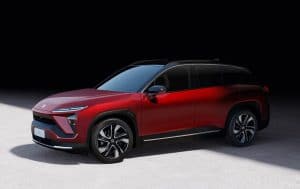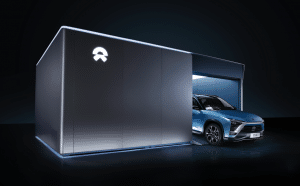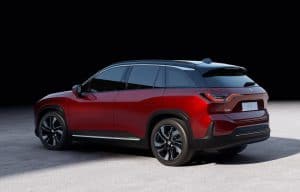
Nio is offering to cut about $10K off the price of a new EV if you lease the battery instead of buy it under its Battery as a Service subscription.
Chinese electric vehicle maker Nio Inc. is offering a way to save EV buyers big money when they purchase their vehicle: don’t buy the battery pack.
The company is introducing a battery leasing service, letting buyers purchase an EV without owning the battery pack instead leasing it. The program is called Battery as a Service, or BaaS, and owners pay a monthly lease of about $140 for the battery. The service is available on the ES8, ES6 or EC6 models and the 70 kWh battery.
Currently, Nio sells vehicles in China, but not in the U.S. so the service is only available in China. The EV maker’s least expensive vehicle starts at 273,600 yuan, or $39,553, for the ES6 sport-utility vehicle without the battery pack. If you add the battery, the price rises to 343,600 yuan, or about $49,627.
(Chinese EV maker Nio facing potential failure.)
“We believe with BaaS, more customers of gasoline cars will consider electric vehicles,” Nio’s Chief Executive William Li told reporters. To make it work, the company formed a joint venture named the Wuhan Weineng Battery Asset Co. Ltd.
Contemporary Amperex Technology Co. Ltd, or CATL, Hubei Science Technology Investment Group Co., Ltd. and a subsidiary of Guotai Junan International Holdings Limited are in on the deal with Nio. Each partner invested $28.89 million and holds a 25% stake in the new company.
Nio has long advocated for battery-swapping instead of recharging your vehicle. The company has 143 battery-swapping stations around China. Li said Nio was building a new battery-swapping station in China every week and planned to build 300 new stations next year.
(Chinese EV maker Nio eyes $1.8B IPO on NYSE.)
As for a potential move to the U.S., Li said the company was looking to enter some international markets – starting in Europe – starting in the second half of 2021 and continuing into 2022. He did not offer a specific reference to when the company will move into the U.S. market.

Chinese EV Maker Nio is swapping batteries instead of plugging them in to “recharge” them at more than 140 locations across the country.
The announcement reveals just how important the subsidies from the Chinese government can be to EV makers there. In March, Nio was scrambling to find cash to support its operations, including tapping municipal and private investor funding.
Nio had a cash balance of just $151.7 million on Dec. 31. That amount of cash would not carry the company forward for vehicle development, production, etc. for the next 12 months, the company noted at the time.
The EV maker has been looking for ways to remain viable, attempting to work out an agreement with the Hefei city government to raise more than 10 billion yuan, or about $1.42 billion, and set up new manufacturing facilities.
(China using subsidies to kick-start auto sales in wake of coronavirus outbreak.)
The company also made several private placements of convertible notes in February and March for an aggregate principal amount of $435 million to support its operations and business development. It ultimately raised a little more than $1 billion.


Renault and Nissan tried this in Europe with the first generation of Zoe and Leaf.
It kept the entry price low, giving good headline figures, but due to the lease payments for the battery didn’t really have any affect on the overall monthly payments for the owner of a new car. Further, because the battery lease payments still had to be paid by the car’s second/third/… owners, it pushed the residual values down significantly.
There will be some customer this will work for, but it won’t work for everybody – unless battery swapping becomes the norm instead of charging in the vehicle.